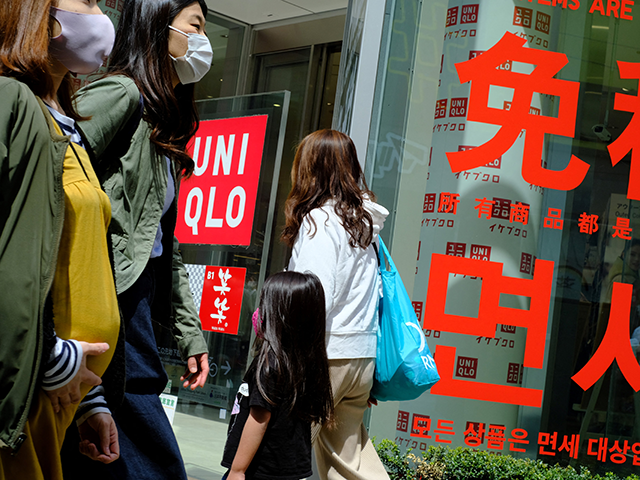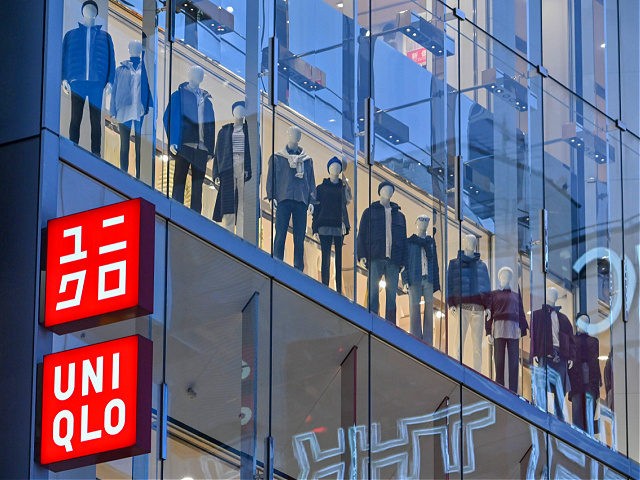Fast Retailing, a Japanese multinational retail company that owns the clothing subsidiary Uniqlo, announced Thursday plans to “temporarily suspend” Uniqlo’s business in Russia.
The company cited the “worsening of the [Ukraine] conflict situation,” Russia’s state-run RT news outlet reported, noting that Uniqlo had expressed a desire to continue normal business operations within Russia in recent days.
“UNIQLO has made everyday clothing available to the general public in Russia too, as part of our mission. However, we have recently faced a number of difficulties, including operational challenges and the worsening of the [Ukraine] conflict situation. For this reason, we will temporarily suspend our operations,” Fast Retailing wrote in a press release issued by its own website on March 10.
Fast Retailing’s founder, Yanai Tadashi, told Japan’s Nikkei financial newspaper in an interview published on March 8 he had no plans to halt business at any of Uniqlo’s 50 stores across Russia despite mounting pressure to do so by the U.S. government and other western governments opposed to Russia’s military invasion of Ukraine on February 24.
“Clothing is a necessity of life,” Yanai told the publication. “The people of Russia have the same right to live as we do.”
The Nikkei noted its interview with Yanai took place one week prior to its publishing on March 8.

Pedestrians walk past a Uniqlo clothing store operated by Japan’s Fast Retailing in Tokyo on April 8, 2021. (Photo by KAZUHIRO NOGI/AFP via Getty Images)
Uniqlo’s new stance on Russia differs significantly with years of support for using cotton sourced from East Turkistan, a region occupied by China that the Communist Party refers to as Xinjiang. China has built over 1,000 concentration camps in the region and extensive evidence has revealed that the government sells members of the native Uyghur ethnic group of the region as slaves. Uyghur slavery is also a significant part of the cotton industry.
Yanai claimed in a December interview with Nikkei that using Uyghur slave labor was a conscious choice to be “neutral between the U.S. and China.”
“I want to be neutral between the U.S. and China. The U.S. approach is to force companies to show their allegiance. I wanted to show that I won’t play that game,” he said.
Yannai referred to the pressure imposed on international companies by the U.S. government and other Western governments to stop using cotton from Xinjiang produced under slave labor conditions, mainly by the territory’s state-oppressed ethnic Uyghur group.
Uniqlo has openly boasted of using cotton sourced from Xinjiang, despite extensive evidence revealing the use of slavery to pick said cotton, specifically supported Uyghur slavery. Uniqlo advertised in 2019 on its website that it sold clothes “made from Xinjiang cotton, famous for its superb quality.”
The Australian Strategic Policy Institute (ASPI) published a report in March 2020 titled “Uyghurs for Sale” that listed Uniqlo as one of “82 foreign and Chinese companies potentially directly or indirectly benefiting from the use of Uyghur workers outside Xinjiang through abusive labour transfer programs as recently as 2019.”
Elsewhere in ASPI’s report, the institute analyzed how the Chinese Communist Party has systematically detained “more than a million” Uyghurs — members of a majority Sunni Muslim, Turkic-speaking ethnic group — and other ethnic minorities in state-run detention camps in Xinjiang since 2017. One of the camp system’s purposes is to facilitate the Communist Party’s use of slave labor in Xinjiang’s economy.
ASPI detailed the Chinese state-run system, writing:
The Australian Strategic Policy Institute (ASPI) has identified 27 factories in nine Chinese provinces that are using Uyghur labour transferred from Xinjiang since 2017. Those factories claim to be part of the supply chain of 82 well-known global brands. Between 2017 and 2019, we estimate that at least 80,000 Uyghurs were transferred out of Xinjiang and assigned to factories through labour transfer programs under a central government policy known as ‘Xinjiang Aid’.
It is extremely difficult for Uyghurs to refuse or escape these work assignments, which are enmeshed with the apparatus of detention and political indoctrination both inside and outside of Xinjiang. In addition to constant surveillance, the threat of arbitrary detention hangs over minority citizens who refuse their government-sponsored work assignments.
Other international clothing companies besides Uniqlo named by ASPI as using Xinjiang cotton in “Uyghurs for Sale” include Zara and H&M.

COMMENTS
Please let us know if you're having issues with commenting.